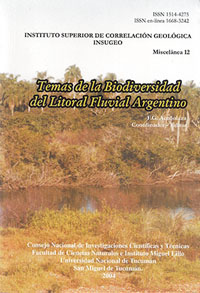Miscelánea 12
Moluscos y Paleoambientes del Cuaternario marino en el sur de Entre Ríos y litoral bonaerense
Marina Laura Aguirre | Enrique Fuks
Para adquirir la publicación haga click aquí
Abstract
Molluscs and paleoenviroment of th marine quaternary in south Entre Ríos and Buenos Aires litoral. The last evidence of several Quaternary sea-level episodes affecting the north-eastern area of Argentina is shown as littoral deposits (shell ridges, estuarine and coastal lagoonal facies, tidal flats, stormy events) of late Pleistocene and mid-Holocene age, containing rich shell concentrations, of which molluscan shells (mostly bivalves and gastropods) are the dominant biogenic component. Especially well preserved are those recorded from the southeast of Entre Ríos Province (area of Gualeguaychú, Gualegauy, Ibicuy), delta area (Isla Martín García, Pilar surroundings), Río de La Plata margin (La Plata-Bahía Samborombón area) and along the oceanic Bonaerensian sector (Punta Rasa down to Bahía Blanca). Displacements of the biogeographic ranges together with qualitative and quantitative changes in biodiversity relative to the modern patterns, suggest biotic responses to environmental and climatic changes both during the Pleistocene and Holocene transgressions: shifts in the salinity zonation along the Río de La Plata ( Mactra , Tagelus , Ostrea ) and Mar Chiquita lagoon ( Littoridina australis ), temperature variations ( Triphora, Urosalpinx, Thais , A.avara ; Noetia, C.rhizophorae, Anomalocardia, Anadara ) and of general energetic conditions ( Ostrea spp). Modern multidisciplinary studies are needed to establish with more precision the innermost limit of the transgressions, their age, distribution, faunas, and palaeoenvironments, especially since the Last Interglacial high sea-level (MOIS5e).




